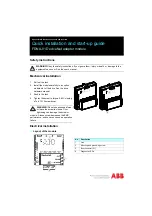
7
Diagnostics
60
Festo – EXCM-10/-30-...-E-EN – 1612b – English
7
Diagnostics
7.1
Diagnostic memory
The diagnostic memory includes up to 200 error messages that are saved in case of a power failure.
If the memory is full, the oldest element will be overwritten (ring buffer).
You can read the diagnostic memory via the Festo Configuration Tool (FCT).
Tab [Diagnostics] [“Read” button]
Deleting the diagnostic memory
The diagnostic memory can be deleted via the Festo Configuration Tool (FCT), whereby a “switch-on
event” (malfunction 3Dh) is generated. The malfunction counter is not reset thereby.
7.2
Types of malfunctions
Malfunctions are distinguished between errors, warnings and information, which have different priorit
ies. The type of malfunction can be parameterised via the Festo Configuration Tool (FCT).
Messages with a higher priority interrupt messages with a lower priority. As malfunctions
can occur and be acknowledged faster than they can be displayed on the 7-segment dis
play, it may be the case that not all malfunctions are displayed. Read the diagnostic
memory (
è
7.1 Diagnostic memory) in order to view all messages.
Error (high priority)
An error always has an error response as a result (
è
7.4.1 Error responses). The error response can be
parameterised via the FCT. Error messages interrupt messages with a lower priority and must be ac
knowledged. Errors cannot be acknowledged until their cause has been remedied.
Warning (medium priority)
Warnings have no influence on the drive behaviour and do not have to be acknowledged. But the cause
of the warning should be eliminated so it will not result in an error.
Warnings have a lower priority than errors and are not displayed if they occur when an error is already
displayed. Otherwise, they are displayed twice in succession. Warnings do not have to be acknow
ledged.
Information (low priority)
If an error message has been parameterised as “information”, it is not displayed on the 7-segments
display. But dependent on the parameterisation, it is stored in the diagnostic memory
(
è
















































